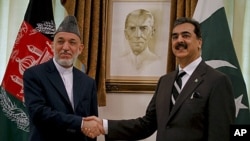The president of Afghanistan, Hamid Karzai, wrapped up a two-day visit to Islamabad Saturday following talks on security issues, bilateral and regional relations and the question of how to end the almost 10-year-old war in his country.
The Afghan delegation headed by Hamid Karzai met with the Pakistani leadership over two days and in the end announced a number of new measures aimed at improving security and ending the war which is deeply affecting both nations.
In a joint statement, it was announced that a Joint Commission for Reconciliation and Peace in Afghanistan is to be created. The commission will look at ways to negotiate with some members of the Afghan Taliban to bring them to the table instead of continuing the armed struggle.
In a news conference at the end of the trip, Pakistani Prime Minister Yousuf Raza Gilani said his nation wants peace in Afghanistan and will do what it can to seek it.
"We both want stability in Afghanistan and in Pakistan, both," he said. "Our only aim is to support the peace process, which is Afghan-led, and it is [an] Aghan process for reconciliation. It is in the interest of Pakistan for a stable, peaceful, prosperous, independent, sovereign Afghanistan."
The delegation from Afghanistan and the Pakistani authorities also discussed such bilateral issues as trade, the effort to control the narcotics trade and coordinating their forces to stop border crossing by militants.
Cross-border traffic has been an issue for years, but recently Pakistan said Afghanistan is being used for a staging area for attacks into Pakistan. Previously it had predominantly been NATO and U.S. critics who accused Pakistan of allowing its territory to be used against international forces fighting in Afghanistan.
Speaking about the withdrawal of U.S. and NATO troops and the handover to Afghan authorities, President Karzai said there is a plan, but specifics are still being worked out, so timing of the withdrawal could depend on the situation on the ground.
"On the withdrawal of U.S. troops from Afghanistan, we have a transition planned that will be completed by 2014, whereby the Afghan forces will take full responsibility for the protection of the Afghan people and territory," he said. "Whether there will be some U.S. troops continuing to stay after 2014 depends on the strategic declaration between the two countries or the strategic document that we are discussing. A delegation will come from the United States to discuss this and that will determine the nature of U.S. presence in Afghanistan."
Many analysts expect the Taliban to demand withdrawal of all U.S. and NATO troops before they come to the negotiating table.
Zafer Hilali is a former Pakistani ambassador to Kabul who says unless the U.S. starts a meaningful withdrawal or gives assurances that such a pullout will happen, any peace talks or negotiations that any commission may be able to attempt will be fruitless.
"Well, first of all, we don’t know if the U.S. is going to withdrawal its troops in any meaningful sense," he said. "I mean, their talk of numbers of 5,000 and 7,000 [troops leaving Afghanistan], this is just a small step. The fact of the matter is that the stated positions of the Taliban and the United States are at the moment very different. And frankly they seem irreconcilable unless this is clarified, unless some kind of an assurance is given to the other side that ‘Look, we will withdraw; let us talk meanwhile,’ and the other side is convinced of the sincerity of that. I don’t think that even peace talks will begin [then] except informal contact."
Pakistan and Afghan officials say they will continue to talk, and plan for their next series of meetings, to be held in Kabul as soon as possible.
Afghan, Pakistani Leaders Seek Path to Peace




